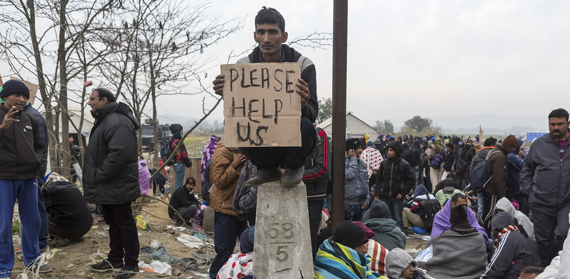The help we provide can’t end at simple relocation. Shutterstock/Ververidis Vasilis
Refugees arriving in the UK have often suffered human rights abuses or torture, lost loved ones, witnessed societies in their home country break down, and experienced difficult journeys and problems upon arrival into the country. Experts in migration and psychology are to highlight the urgent need for improved mental health and well-being support for these vulnerable refugees, at an event hosted in Coventry later this month.
Researchers from Coventry University1 will present findings from a study which is being carried out in collaboration with Coventry and Warwickshire Partnership NHS Trust (CWPT), and will recommend that specialised services are needed to help asylum seekers who may have mental health and other support needs as a result of their traumatic experiences.
Recommendations from the University’s study, which is ongoing, include:
- specific government policy addressing appropriate support to enhance refugees’ integration;
- specialised services for refugees, including a holistic model of care to support survivors of trauma;
- clearer referral pathways from different agencies, particularly from voluntary sector services;
- screening of refugees’ mental health needs at GP surgeries in dispersal cities;
- awareness training for interpreters and front of house service providers supporting asylum seekers;
- addressing the need for sanctuary and the right to work.
The event – which is supported by Coventry Refugee and Migrant Centre, City of Sanctuary and the British Psychological Society (BPS) – aims to promote discussion of the proposals and generate policy recommendations through discussion between health and community service providers, aid agencies, policy-makers, employer organisations and refugees themselves.
Amongst the event’s expert speakers will be Professor Jamie Hacker-Hughes, vice-president of the BPS, and Jonathan Ellis, head of policy, research and advocacy at the British Red Cross.
Dr. Helen Liebling, senior lecturer-practitioner in clinical psychology from both Coventry University and CWPT, said:
“The issue of mental health needs amongst refugees seeking asylum in the UK is greatly underestimated, particularly in children. Migrants have often escaped war and devastation in their home countries and have endured traumatic journeys in search of safety, and yet in many cases the well-being support services they desperately need, that enhance their resilience, are simply not available.
Suzanne Brown, trainee clinical psychologist at CWPT, said:
“It is crucial that we talk about these issues with those who are most affected. As part of our research, we’ve been able to speak with asylum seekers with the support of the Coventry Refugee and Migrant Centre, and it’s through these conversations that we’ve been able to build up a series of recommendations and policy suggestions – all of which we’ll be discussing at our forthcoming event.”
Simon McMahon, research fellow at the Centre for Trust, Peace and Social Relations, said:
“In 2015 over one million people crossed the Mediterranean to Europe in search of safety and a better life, and thousands died along the way. Alongside this study, we are also exploring the factors behind migration in the Med as part of a project called MEDMIG, and we hope to better understand the unprecedented movements in the region by examining the journeys, motivations and aspirations of refugees and migrants in Italy, Greece, Turkey and Malta. Our findings highlight the need for a closer understanding of the complexities of people’s journeys and experiences to better provide for their well-being in the future.”
Sabir Zazai, director of the Coventry Refugee and Migrant Centre, said:
“The research being undertaken has been the first attempt to get real information about the mental health, well-being and justice needs of refugees and asylum seekers in Coventry and Warwickshire, and the findings could be used by policy-makers in other parts of the country and even across Europe.
It’s a great honour for Coventry and the CRMC to be a part of such an important and high-level conference.”
The event will take place on Tuesday 27 September at Methodist Central Hall in Coventry. Those wishing to attend should register here, or contact Charlotte Martin.
1 The research is being carried out by academics from the University’s Centre for Trust, Peace and Social Relations (CTPSR) and the Centre for Research in Psychology, Behaviour and Achievement (CPBA).





Comments are disabled